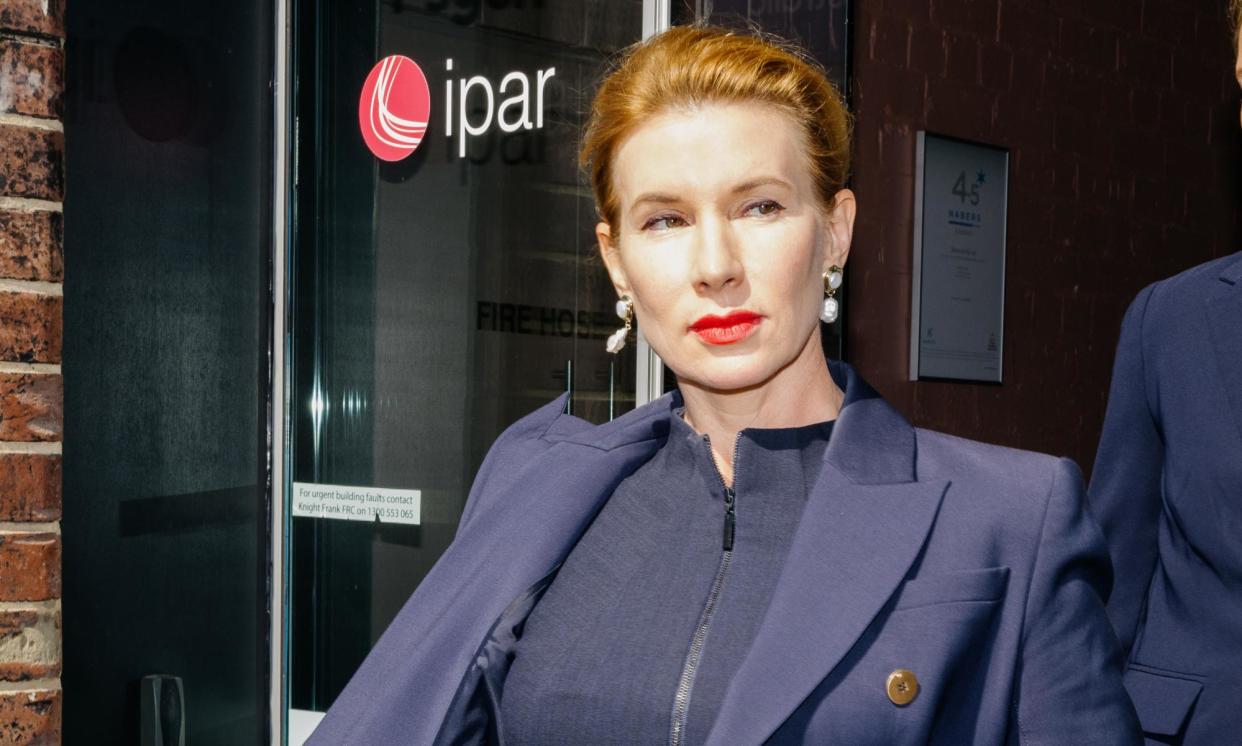Artist behind Mona’s ladies-only lounge ‘absolutely delighted’ man is suing for gender discrimination

The creator of an art installation that has become the subject of a formal anti-discrimination complaint says she is “absolutely delighted” that the case has ended up in Tasmania’s civil and administrative tribunal.
Kirsha Kaechele’s installation Ladies Lounge opened in Hobart’s Museum of Old and New Art (Mona) in 2020, and sees women who enter the space being pampered by male butlers and served champagne while being surrounded by some of the museum’s finest pieces of art. Those who do not identify as women are not permitted entry.
On Tuesday, the performance piece expanded beyond the subterranean halls of the museum on Tasmania’s Berriedale Peninsula, with New South Wales man Jason Lau seeking justice in the tribunal over the museum’s alleged discrimination against some visitors.
Related: Jónsi from Sigur Rós makes a volcano: ‘It goes straight up the arse to rattle your bones’
Lau, who visited Mona last April, claims he was denied entry into the Ladies Lounge because of his gender – a contravention of Tasmania’s Anti-Discrimination Act.
Kaechele, whose husband David Walsh owns Mona, said she was an “artist who works in the world and I tend to engage life as a medium”.
“So it was a dream come true for the work to leave the museum and enter the realm of the world – a completely new space,” Kaechele told Guardian Australia on Wednesday. “It was very interesting to have artwork come to life in a courtroom.”
The opportunity to extend the performance aspect of Ladies Lounge was embraced by the artist and 25 female supporters, who entered Tuesday’s tribunal hearing wearing a uniform of navy business attire. Throughout the day’s proceedings, they engaged in discreet synchronised choreographed movements, including leg crossing, leaning forward together and peering over the top of their spectacles. Apart from the gentle swish of 25 pairs of nylon clad legs crossing in unison, the support party remained silent. When the proceedings concluded, the troupe exited the tribunal to the Robert Palmer song Simply Irresistible.
During her defence, Kaechele ran through a timeline of Australian women’s lived experience of discrimination and exclusion, including being barred from working in the public service sector once married, and receiving lower pay than men for the same work – something Mona’s own management had engaged in up until 10 years ago, the artist pointed out in her evidence.
Lau argued that denying men access to some of the museum’s most important works (there is a Sidney Nolan, a Pablo Picasso and a trove of antiquities from Mesopotamia, Central America and Africa in the women-only space) is discriminatory. Kaechele said that was the point.
“The men are experiencing Ladies Lounge, their experience of rejection is the artwork,” she said.
“OK, they experience the artwork differently than women, but men are certainly experiencing the artwork as it’s intended.”
An experience in a pub on Flinders Island several years ago, when Kaechele and a girlfriend were advised by male patrons that they would feel “more comfortable” retiring to the ladies lounge, inspired the work.
The Californian-born artist was not aware that ladies lounges are a feature of Australia’s recent social history, and that Australian women were not allowed to enter public bars until 1965.
Then during Covid restrictions, Kaechele and Walsh were forced to endure long periods of separation.
“I turned to the company of women, and I discovered how absolutely delightful it is to be in a women’s-only gathering,” she says.
“I don’t know what it is, but there’s just something wonderful about it, yet I discovered it so late in life. How did I miss that? It’s just an absolutely beautiful thing to do together with women.”
Kaechele admits the museum has amassed a “large file” of complaints over Ladies Lounge. But apart from the current case, only one other complainant has sought formal redress.
“Like Jason, he felt it was sexual discrimination and wanted access for men. And when I said, ‘well, men can’t come in’, he said ‘then why should I have to pay the same amount if I don’t get to experience the artwork?’ And I said, ‘you do experience the artwork, because the rejection is the artwork’. And he understood that and he appreciated it and he dropped the case.”
Mona’s lawyer Catherine Scott told Guardian Australia the case was an unusual one because the artwork was both a physical entity – a lounge – and a piece of performance art.
“There is the participatory element of allowing women and denying men,” she says.
“So we’re looking at the role that art can play in promoting equal opportunity, and the law doesn’t deal well with that. Mona’s case is that art can be a really powerful medium in promoting equal opportunity by not just experience, but by conversation, and specifically redressing the past exclusion of women.”
Related: The 10 strangest artefacts in Australian museums – sorted
Mona’s legal team will be relying on the tribunal’s interpretation of section 26 of Tasmania’s Anti-Discrimination Act, under which a person is permitted to discriminate against another person in a situation designed to promote equal opportunity for a group of people who are disadvantaged or have a special need because of a prescribed attribute – in this case gender.
It is under clauses like this in most of Australia’s anti-discrimination legislation that organisations such as male-only clubs and women-only gyms are able to operate.
Scott said Lau’s decision to pursue the museum through the tribunal was not vexatious and he was not seeking compensation.
“It seems that Mr Lau and his complaint are genuine – he wants everyone to be allowed entry,” Scott says. “But if Mona agreed to that it would fundamentally undermine the work.”
Guardian Australia was unable to contact Lau for comment on Wednesday.
The tribunal is expected to hand down its decision within a month.


